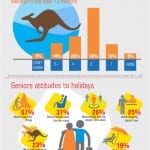 I’ve just finished reading the discussions on a few Tourism Marketing groups on LinkedIn. The discussions are a fascinating insight into the mindset of the Travel and Tourism industry and the companies who service it.
I’ve just finished reading the discussions on a few Tourism Marketing groups on LinkedIn. The discussions are a fascinating insight into the mindset of the Travel and Tourism industry and the companies who service it.
There are discussions about whether to do trade shows or road shows, the value of content, and the role of brochures vs. online. In other environments, I am constantly asked about the future of Visitor Information Centres (VICs) or what social media channels are best.
I often post comments on LinkedIn and I always answer these questions with the respect that the anxiety behind them deserves. The digital age is well and truly here. It is both an exciting and challenging time for an industry composed largely of small businesses.
But having read another passionate defence of the role of content, I was just about to reply when I realised I was probably going to repeat myself!
The real answer to most of these things is ‘Does it fit with your strategy or vision for your business? If it does, do it. If it doesn’t, don’t (but make sure you keep an eye on it!).
The challenge is that many small businesses really don’t think strategically about their business. They know ‘in their heads’ what their vision is, but often they haven’t articulated this in any structured way. I think some would probably put this in the category of ‘marketing fluffy words’.
Can Your Tourism Strategy Adapt to Changes?
Many years ago, I had the privilege of working with one of the fathers of the APEX fare. For all its later issues, APEX was a fundamental shift in the idea of looking at the value of air travel through the consumers’ eyes rather than those of the pricing department and recognising different types of consumers have different priorities and can make different trade-offs. He taught me to cling grimly to the strategy above all else – just be adaptive to the circumstance in how you do it.
Besides inventing APEX, he turned around a division of an airline that had lost money for 40 years to profit in 3. It is still studied as a textbook business case for the airline industry for nearly half a century. So I reckon he knew a bit about the challenges of applying strategy in tough times.
This came back to me very forcefully recently across a number of situations and meetings. When I look carefully at all the most successful organisations in any category (including in one case a not-for-profit I am working with outside the tourism industry), the secret to that success is fundamentally this….
Firstly, they set their vision in place. Then they set in place a strategy that drives towards that. For every activity that goes into that strategy which requires time, money, or both, they ask themselves the  question ‘how does this activity help me build that vision relative to the other uses for this time/money?’
question ‘how does this activity help me build that vision relative to the other uses for this time/money?’
But just as importantly, they take care to the ground in an understanding of how the world looks through their customers’ eyes. Who are they? What do they want? Where and how do they get information? Through which channels do they want to connect with me? How does this change over time?
They then apply that ruthlessly but, just like my old boss, work around the situations that arise.
The title of this piece reflects another great example of this. It’s adapted from Bill Clinton’s successful election philosophy of 1992. He clearly recognised that to win the presidency in a country as philosophically divided as the USA, he had to focus on the thing that most united voters – the economy. As such, in any press situation or response, the watchword was ‘It’s the economy, stupid. (With a bit of Homer Simpson thrown in because I don’t think you are stupid!)
Don’t get me wrong – I think many of the initiatives that are discussed in Linkedin travel industry groups are valuable elements of a marketing strategy. (I’m a particular fan of the ‘content is king’ and semantic search elements of these discussions). But if you don’t have that strategy then you’ll waste a lot of time, energy, and money working out which ones. And when the going gets tough, it will be even worse.
So far from being ‘marketing fluff’, vision and strategy may be the most valuable time you will ever spend.
Try adopting Bill Clinton’s approach and in every one of these situations take as your starting point ‘Doh, it’s the strategy!’
Do you want to hear more from us?
Want to be kept up to date with the latest travel and tourism insights? Join Our Mailing List. Every 2 weeks, we send the latest practical insight for you to apply to your business and destination marketing.




Well done